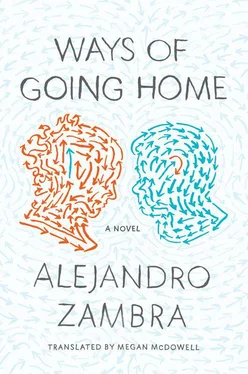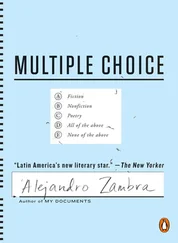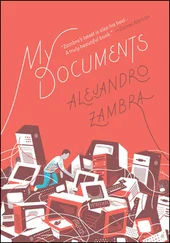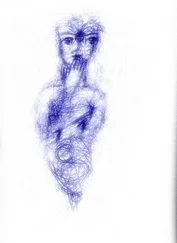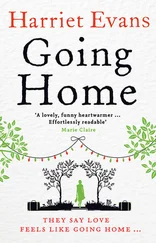“But we were never, your father and I, either for or against Allende, or for or against Pinochet.”
“Why were you afraid of Roberto?”
“Well, I don’t know if it was fear. But now you’re telling me he was a terrorist.”
“He wasn’t a terrorist. He hid people, he helped people who were in danger. And he also helped pass information.”
“And that doesn’t seem like much to you?”
“It seems like the least he could do.”
“But those people he hid were terrorists. They planted bombs. They planned attacks. That’s reason enough to be afraid.”
“Fine, Mom, but dictatorships don’t fall just like that. The struggle was necessary.”
“What do you know about those things? You hadn’t even been born yet when Allende was in power. You were just a baby during those years.”
* * *
I’ve heard that comment many times. You hadn’t even been born. This time, though, it doesn’t hurt. In a way, it makes me laugh. Just then my mother asks me, as if it were relevant:
“Do you like Carla Guelfenbein?”
I don’t know how to answer. I say no. “I don’t like those books, those kinds of books,” I say.
“Well, we don’t like the same kinds of books. I liked her novel The Other Side of the Soul . I identified with the characters, it moved me.”
“And how is that possible, Mom? How can you identify with characters from another social class, with conflicts that aren’t, that could never be, conflicts in your life?”
I speak in earnest, very seriously. I feel like I shouldn’t speak so seriously. That it isn’t appropriate. That I’m not going to solve anything by making my parents face up to the past. That I’m not going to achieve anything by taking away my mother’s right to freely give her opinion on a book. She looks at me with a mixture of anger and compassion. With a little exasperation.
“You’re wrong,” she says. “Maybe it isn’t my social class, fine, but social classes have changed a lot, everyone says so. And reading that novel I felt that yes, those were my problems. I understand that what I’m saying bothers you, but you should be a little more tolerant.”
“I just said I didn’t like that novel. And that it was strange that you would feel you identified with characters from another social class.”
“And Claudia?”
“What about Claudia?”
“Is Claudia from your social class? What social class are you from, now? She lived in Maipú, but she wasn’t from here. She looks more refined. You also look more refined than us. No one would say you were my son.
“I’m sorry,” says my mother before I can answer the question, which, in any case, I wouldn’t know how to answer. She gives me more mate and lights two cigarettes with the same match. “We’re going to smoke inside here, even though your father doesn’t like it.” She passes one to me.
“It isn’t your fault,” she says. “You left home very young, at twenty-two.”
“At twenty, Mom.”
“At twenty, twenty-two, it doesn’t matter. Very young. I sometimes think about what life would be like if you had stayed home. Some kids do. That thief boy, for example. He stayed here and became a thief. Others stayed too, and now they’re engineers. That’s life: you become a thief or an engineer. But I don’t really know what you became.”
“I don’t know what my father became,” I say, practically involuntarily.
“Your father has always been a man who loves his family. That’s what he was, that’s what he is.”
“And what would life have been like if I had stayed, Mom?”
“I don’t know.”
“It would have been worse,” I answer.
My mother nods. “Maybe it’s better for us to be farther apart,” she says. “I like how you are. I like that you defend your ideas. And I like that girl, Claudia, for you, even if she isn’t from your social class.”
She carefully puts out her cigarette and washes the ashtray before going to bed. I open the door and sit on the threshold. I want to look at the night, look for the moon, and to finish off in long gulps the whiskey I’ve just poured myself. I lean on my parents’ car, a new Hyundai truck. The alarm goes off and my father gets up. I’m moved by the sight of him in his pajamas. He asks me if I’m drunk. “A little,” I answer in a faint voice. “Just a little.”
It’s very late, five in the morning. I go up to the room. Claudia is sleeping, I lie down next to her; I move, wanting to wake her up. It’s not just a little: I’m drunk. The darkness is almost complete and yet I can feel her gaze on my forehead and my chest. She strokes my neck, I bite her shoulder. “We can’t miss this chance,” she says, “to make love in your parents’ house.” Her body moves in the darkness as the day breaks.
At eight in the morning we decide to leave. I go to my parents’ room to say goodbye. I see them sleeping in an embrace. It’s a weighty image for me. I feel ashamed, happy, and discomfited. I think that they are the beautiful survivors of a lost world, of an impossible world. My father wakes up and asks me to wait. He wants to give me some shirts he’s getting rid of. There are six, they don’t look old; I can tell they’ll be too small for me but I accept them anyway.
We go home and it’s as if we were returning from war, but from a war that isn’t over. I think, We’ve become deserters. I think, We’ve become war correspondents, tourists. That’s what we are, I think: tourists who arrive with their backpacks, their cameras, and their notebooks, prepared to spend a long time wearing out their eyes, but who suddenly decide to go home, and as they do they breathe a long sigh of relief.
A long relief, but a temporary one. Because in that feeling there is innocence and there is guilt, and although we can’t and don’t know how to talk about innocence or guilt, we spend our days going over a long list of things that back then, when we were children, we didn’t know. It’s as if we had witnessed a crime. We didn’t commit it, we were only passing through the place, but we ran away because we knew that if they found us there we’d be blamed. We believe we are innocent, we believe we are guilty: we don’t know.
Back home again Claudia looks at the shirts my father gave me. “I didn’t have my own clothes for many years,” she says suddenly. “First I used Ximena’s castoffs, and then my mother’s dresses. When she died we fought over everything, down to the last rag she left, and now I think maybe it was then that our relationship broke down for good. My father’s suits, on the other hand, are still untouched in the closet in his room,” she says.
I kept my father’s shirts in a drawer for months. In the meantime, many things have happened. In the meantime Claudia left and I started to write this book.
Now I look at those shirts, I spread them out on the bed. There is one I especially like, with an oil-blue color. I just tried it on, it’s definitely too small. I look at myself in the mirror and I think how our parents’ clothes should always be too big for us. But I also think I needed it; sometimes we need to wear our parents’ clothes and look at ourselves for a long time in the mirror.
We never spoke honestly about that trip to Maipú. Many times I wanted to know what Claudia had felt, why she had wanted us to stay there, but every time I asked her, she answered me with excuses or stock phrases. Then came some long and silent days. Claudia seemed concentrated, busy and a little tense. I shouldn’t have been surprised when she announced her decision. Supposedly I was expecting the end; supposedly there was no other ending possible.
“I’ve gone back to see Ximena,” she said first, happily. She still hadn’t agreed to sell the house, but they had renewed their relationship and that was much more important to Claudia than the inheritance. She told me they talked for hours, with no animosity of any kind. “Years ago, too many years ago now,” she told me then, changing her tone in a way that seemed painful, “years ago I discovered I wanted a normal life. That I wanted, above all, to be calm. I already lived through emotions, all the emotions. I want a quiet, simple life. A life with walks in the park.”
Читать дальше
